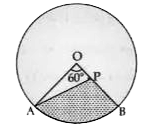The sum of an arithmetic series with 15 terms is 180. Then the 8th term is:Solution in Kannada
8
12
15
18
The correct Answer is:B
Step by step video, text & image solution for The sum of an arithmetic series with 15 terms is 180. Then the 8^(th) term is: by Maths experts to help you in doubts & scoring excellent marks in Class 10 exams.
Updated on:21/07/2023Topper's Solved these Questions
- ARITHMETIC PROGRESSIONSBOOK - OSWAAL PUBLICATIONCHAPTER - ARITHMETIC PROGRESSIONSEXERCISE - VERY SHORT ANSWER TYPE QUESTION
8 Videos
- ARITHMETIC PROGRESSIONSBOOK - OSWAAL PUBLICATIONCHAPTER - ARITHMETIC PROGRESSIONSEXERCISE - SHORT ANSWER TYPE QUESTION
15 Videos
- AREAS RELATED TO CIRCLES BOOK - OSWAAL PUBLICATIONCHAPTER - AREAS RELATED TO CIRCLES EXERCISE - LONG ANSWER TYPE QUESTIONS - I
20 Videos
- CIRCLES BOOK - OSWAAL PUBLICATIONCHAPTER - CIRCLES EXERCISE - TEXTBOOK CORNER (EXERCISE 4.2)
13 Videos
Similar Questions
What is the common difference between the consecutive terms of an A.P.
View SolutionHow many two digit numbers are divisible by 3?
View SolutionIn the given figure, AOB is a sector of angle 60∘ of a circle with centre O and radius 17 cm . If AP ⊥ OB and AP = 15 cm find the area of the shaded region.

View SolutionFrom a point Q ,the length of the tangent to a circle is 24 cm and the distacne to Q from the centre is 24.5 cm.The radius of the circle is
(a) 4.92 cm
(b)12 cm
©15 cm
(d)24.5 cm
View SolutionIf the sum of the first 100 terms of an arithmetic progression is −1 and the sum of the even terms is 1, then the 100th term of the arithmetic progression is
View SolutionIf the sum of first 8 terms of arithmetic progressions is 136 and that of first 15 terms is 465, then find the sum of first 25 terms.
OR
The sum of the 5thand9th terms of an arithmetic progression is 40 and the sum of the 8th and 14th term is 64, find the sum of first 20 terms.
View Solution(i) The sum of n terms of two arithmetic series are in the ratio of 7n+14n+27. Find the ratio of their 11 th terms.
(ii) The sum of n terms of arithmetic progressions are in the ratio(3n+8):(7n+15). Find the ratio of their 12 th terms.
View SolutionThe sum of n terms of two arithmetic progressions are in the ratio (3n + 8) : (7n + 15). Find the ratio of their 12th terms.
View SolutionThe sum of n terms of two arithmetic progressions are in the ratio (3n + 8) : (7n + 15). Find the ratio of their 12th terms.
View SolutionThe sum of n terms of two arithmetic progressions are in the ratio (3n + 8) : (7n + 15). Find the ratio of their 12th terms.
View SolutionThe sum of n terms of two arithmetic progressions are in the ratio (3n + 8) : (7n + 15). Find the ratio of their 12th terms.
View SolutionThe sum of n terms of two arithmetic progressions are in the ratio (3n+8):(7n+15). Find the ratio of their 12th terms.
View SolutionAn arithmetical progression has positive terms. The ratio of the differrence of the 4th and the 8th term to 15th term is 415 and the square of the difference of the 4th and the 1st term is 225. Which term of the series is 2015 ?
View SolutionThe sums of n terms of two arithmetic series are in the ratio of 2n +1 : 2n-1 . Find the ratio of their 10 th terms .
View SolutionThe sum of n terms of two arithmetic progressions are in the ratio (3n+8):(7n+15). Find the ratio of their 12th terms.
View Solution
